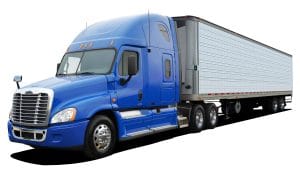Daimler Recalls Freightliner Cascadias
 Daimler Trucks North America can join the list of automobile manufacturing companies that had to issue recalls this year. According to the National Highway Traffic Safety Administration (NHTSA), the manufacturing company recalled its 2022 Freightliner Cascadias after five models caught on fire.
Daimler Trucks North America can join the list of automobile manufacturing companies that had to issue recalls this year. According to the National Highway Traffic Safety Administration (NHTSA), the manufacturing company recalled its 2022 Freightliner Cascadias after five models caught on fire.
The fires were caused by a misdirected exhaust pipe defect. The exhaust pipe outlet may have been improperly installed, with the tip facing towards the battery boxes positioned directly above the frame rail. Some of the indications of an exhaust defect include residue on the surrounding components, the melting of surrounding components and the smell of melted materials. Experts suspect the battery box can melt and increase the chances of a fire.
To date, 460 vehicles have been recalled. The company will inform all drivers of the recall through certified mail by November 14. This is not even the first recall that Daimler Trucks North America has had to issue. Earlier in September, the company had to issue a recall for more than 100,000 Freightliner Cascadias with the model year 2019, due to a steering defect potentially leading to a complete loss of control.
Common causes of vehicle recalls
Organizations such as the NHTSA are dedicated to ensuring that all vehicles on the road are safe to operate. When vehicles are not safe to operate on the road, they put drivers, passengers, and other motorists in danger. A potential safety defect discovered in a vehicle leads to a vehicle recall. Some of the common causes of vehicle recalls involve defective machinery and improper handling. In the past, parts such as car seats, tires, and air bags were some of the common defective parts of a vehicle.
While these parts are still capable of becoming defective, they have just as much of a risk of causing fatal accidents such as a steering wheel defect or a battery defect that can cause a fire. Any defective part of a vehicle, no matter how small, is cause for concern. Similar to defective machinery, improper handling and construction of a vehicle can lead to a vehicle recall. A part of a vehicle becomes defective when it has been manufactured incorrectly.
Who is liable when a recalled vehicle leads to a traffic accident?
Just because there are certain protocols that automobile manufacturing companies must abide by concerning a vehicle recall, it does not mean that drivers may not fall victim to a traffic accident. For example, drivers who are aware of the vehicle recall but are waiting for the manufacturing company to fix their vehicles are still at risk of getting into traffic accidents.
When a driver is involved in a traffic accident as a result of a vehicle recall, several factors can determine whether a manufacturing company is liable. Some of the factors include the timing of the recall, whether the recall was in effect at the time of the accident, and the driver’s actions after receiving notice of the recall.
Recall time plays a role in vehicle manufacturer liability
The timing of a recall can play an essential role in determining liability in a traffic accident. For example, a driver who becomes involved in a car accident due to a defective vehicle can still hold the manufacturing company liable for any injuries and damages, regardless of whether there was a recall issued or not. This is because manufacturing companies have a duty to guarantee that any vehicle manufactured and distributed on the market is safe.
However, if a driver was involved in a traffic accident after the manufacturing company issued a recall, it can be difficult to hold the company liable. The manufacturing company can argue that the driver was aware of the defects in the vehicle and had an opportunity to fix the vehicle but chose not to.
With this type of scenario, several factors can be used to determine whether the driver or the manufacturing company was negligent. Some of the factors include the amount of time that passed between the announcement of the recall and the date of the accident, the nature of the defect and the role it played in the accident, the manner in which drivers and consumers were notified of the recall, and the transparency of the instructions given to the drivers regarding the recall.
Even with taking these factors into considerations, the courts may still hold the manufacturing company liable for the accident. A driver’s potential negligent actions do not exempt the company from liability.
What happens if a driver’s accident occurs after a vehicle recall?
There are occasions where a company recalls a vehicle for a specific defect, and after an extended period of time, that same manufacturer issues another recall revolved around the same defect. These occasions are quite common. For example, the automobile manufacturing company General Motors had to recall their Chevy Bolts due to a battery defect issue in November of 2020, only to issue a second recall for the same defect in August of this year.
When drivers are involved in accidents during this “in-between” time, it is best to seek the advice of an attorney concerning the best course of action.
When manufacturing companies try to shift blame back to the driver
Automobile manufacturing companies may argue that the driver’s own negligent actions, and not the defective parts of the vehicle, led to a traffic accident. Companies will at least attempt to argue that the driver was partially at fault for the accident.
You do not have to suffer in silence when a defective product causes injury to you or a family member. Rely on the Mississippi product liability lawyers of Merkel & Cocke, PA, to fight for the compensation you deserve. Located in Jackson, Clarksdale, Greenville, and Oxford, we serve and assist injured clients throughout Mississippi. Call us at 662-627-9641, or complete a contact form to schedule a free consultation to discuss your product liability case.

After graduating from the University of Virginia Law School in 1975, Mr. Cocke and Mr. Merkel established Merkel & Cocke, P.A. in 1982. Since that time the emphasis of Mr. Cocke’s practice has progressed toward medical malpractice. At the present time his practice is exclusively devoted to handling medical negligence cases for the plaintiff, either as a result of direct contact by the client or on referral from other attorneys who are not familiar with the handling of medical negligence cases. Mr. Cocke was selected Best Lawyer of the year for 2012 and 2014 in The Memphis area in the field of Medical Malpractice and has been selected a Best Lawyer and Super Lawyer every year since 2006. Learn more about John Hartwell Cocke here.
